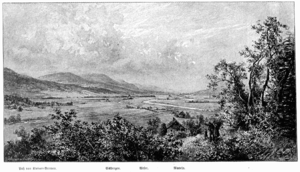Battle of the Weser River
| Battle of the Weser River | |||||||
|---|---|---|---|---|---|---|---|
| Part of the Germanic Wars | |||||||
 The field of Idistavisus, c. 1895 |
|||||||
|
|||||||
| Belligerents | |||||||
|
|
Germanic tribes | ||||||
| Commanders and leaders | |||||||
|
Germanicus Flavus |
Arminius Inguiomer |
||||||
| Strength | |||||||
|
4 legions and 5,000 Batavian allies: a total of 35,000 1,000 praetorians 24,000 infantry (vexillationes), 4,800 alae 5,000 allies |
over 50,000 | ||||||
| Casualties and losses | |||||||
| Minimal | Heavy | ||||||
4 legions and 5,000 Batavian allies: a total of 35,000 1,000 praetorians 24,000 infantry (vexillationes), 4,800 alae
The Battle of the Weser River, sometimes known as a first Battle of Minden, or more usually the Battle of Idistavisus, was fought in 16 AD between Roman legions commanded by Emperor Tiberius' heir and adopted son Germanicus, and an alliance of Germanic tribes commanded by Arminius. The battle marked the end of a three-year series of campaigns by Germanicus in Germania.
The Germanic chief, Arminius, had been instrumental in the organising of the Battle of the Teutoburg Forest, in which three Roman legions, moving west to winter quarters, were ambushed and annihilated by allied Germanic forces in the deep forests of western Germania. This loss loomed large in the Roman psyche and revenge for this defeat, as well as the neutralization of the threat of Arminius, were the impetus for Germanicus' campaign. In the year before the battle, 15 AD, Germanicus had marched against the Chatti and then against the Cherusci under Arminius. During that campaign, the Romans advanced along the region of the Teutoburg Forest where the legions had been massacred and buried the bones of the Roman soldiers that still lay there. A Legionary standard from the battle was also recovered. Skirmishes with the Germani were constant but the Romans could not draw them into open battle.
Ancient sources identify the location as Idistavisus, but the precise location is unknown, save that it was on the right side of the Weser River, somewhere between the cities of Minden and Hamelin of present-day Germany.
The Germanic tribes generally avoided open large-scale combat but by repeated Roman incursions deep into Germanic territory, Germanicus was able to force Arminius, at the head of a large but fractious coalition, into response. The Romans, along with the Chauci who fought on the Roman side as auxiliaries, defeated the allied Germanic forces decisively, inflicting heavy losses on them. Arminius and his uncle Inviomerus evaded capture and fled with the remnants of their army into the forests.
...
Wikipedia
